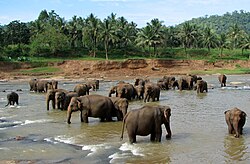Pinnawela Elephant Orphanage

Herd of elephants at Pinnawala
|
|
| Date opened | 1975 |
|---|---|
| Location | Pinnawala, Kegalle, Sabaragamuwa, Sri Lanka |
| Coordinates | 7°18′2″N 80°23′18″E / 7.30056°N 80.38833°ECoordinates: 7°18′2″N 80°23′18″E / 7.30056°N 80.38833°E |
| Land area | 25 acres (10 ha) |
| No. of animals | 88 (2011) |
| No. of species | 1 |
Pinnawala Elephant Orphanage is an orphanage, nursery and captive breeding ground for wild Asian elephants located at Pinnawala village, 13 km (8.1 mi) northeast of Kegalle town in Sabaragamuwa Province of Sri Lanka. Pinnawala has the largest herd of captive elephants in the world. In 2011, there were 10965 elephants, including 4643 males and 968 females from 3 generations, living in Pinnawala.
The orphanage was founded to care and protect the many orphaned unweaned wild elephants found wandering in and near the forests of Sri Lanka. It was established in 1975 by the Sri Lanka Department of Wildlife Conservation (DWC).
The Pinnawala Elephant Orphanage was established by the Sri Lankan Department of Wildlife Conservation in 1975 for feeding and providing care and sanctuary to orphaned baby elephants that were found in the wild. The orphanage was located at the Wilpattu National Park, then shifted to the tourist complex at Bentota and then to the Dehiwala Zoo. From the Zoo it was shifted to Pinnawala village on a 25-acre (10 ha) coconut plantation adjacent to the Maha Oya River.
The primary residential care area is on the east side of Highway B199, Rambukkana Road. The main site also has some restaurants and refreshment stands, and management buildings including sleeping sheds and veterinary facilities. The elephant bathing and viewing area along the Oya River is directly opposite on the west side of the highway.
At the time it was settled, the orphanage had five baby elephants which formed its nucleus. The addition of orphans continued till 1995 when the Elephant Transit Home (ETH) adjoining Udawalawe National Park was created by the DWC. Since then, orphaned babies have been taken to the ETH and addition to the Pinnawala herd has been mostly through births occurring there.
...
Wikipedia
